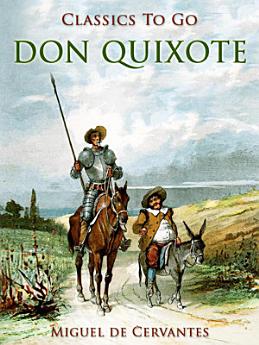Don Quixote
Jan 2016 · Otbebookpublishing
Ebook
1091
Pages
family_home
Eligible
info
reportRatings and reviews aren’t verified Learn More
About this ebook
Miguel de Cervantes Saavedra; 29 September 1547 (assumed) – 22 April 1616), often known as Cervantes, was a Spanish novelist, poet, and playwright. His magnum opus, Don Quixote, considered to be the first modern European novel, is a classic of Western literature, and is regarded amongst the best works of fiction ever written. His influence on the Spanish language has been so great that the language is often called la lengua de Cervantes ("the language of Cervantes"). He was dubbed El Príncipe de los Ingenios ("The Prince of Wits"). (Excerpt from Wikipedia)
About the author
Miguel de Cervantes Saavedra (1547-1616) stands as a towering figure in Spanish literature, often hailed as the "Prince of Wits." Born in Alcalá de Henares, Spain, Cervantes led a life as adventurous and tumultuous as the characters he created. His early years were marked by military service, including participation in the pivotal Battle of Lepanto in 1571, where he sustained injuries that left his left hand maimed, earning him the moniker "El Manco de Lepanto."Cervantes' life was riddled with hardships, including five years of captivity in Algiers after being captured by Barbary pirates. Upon his return to Spain, he struggled with financial instability, working various jobs, including as a purchasing agent for the Spanish Armada and later as a tax collector—a position that led to his imprisonment due to discrepancies in his accounts.Despite these challenges, Cervantes' literary genius flourished. His works are celebrated for their innovative narrative techniques and deep psychological insight. He is credited with pioneering the modern novel, blending realism with idealism and satire. His influence extends far beyond Spanish literature, impacting writers such as Laurence Sterne, Gustave Flaubert, and James Joyce.Cervantes also championed revolutionary ideas, subtly critiquing the rigid social and religious norms of his time. His nuanced portrayal of human folly, ambition, and the quest for identity resonates with contemporary readers, making him a timeless figure whose legacy continues to inspire and provoke thought.
Rate this ebook
Tell us what you think.
Reading information
Smartphones and tablets
Install the Google Play Books app for Android and iPad/iPhone. It syncs automatically with your account and allows you to read online or offline wherever you are.
Laptops and computers
You can listen to audiobooks purchased on Google Play using your computer's web browser.
eReaders and other devices
To read on e-ink devices like Kobo eReaders, you'll need to download a file and transfer it to your device. Follow the detailed Help Center instructions to transfer the files to supported eReaders.








